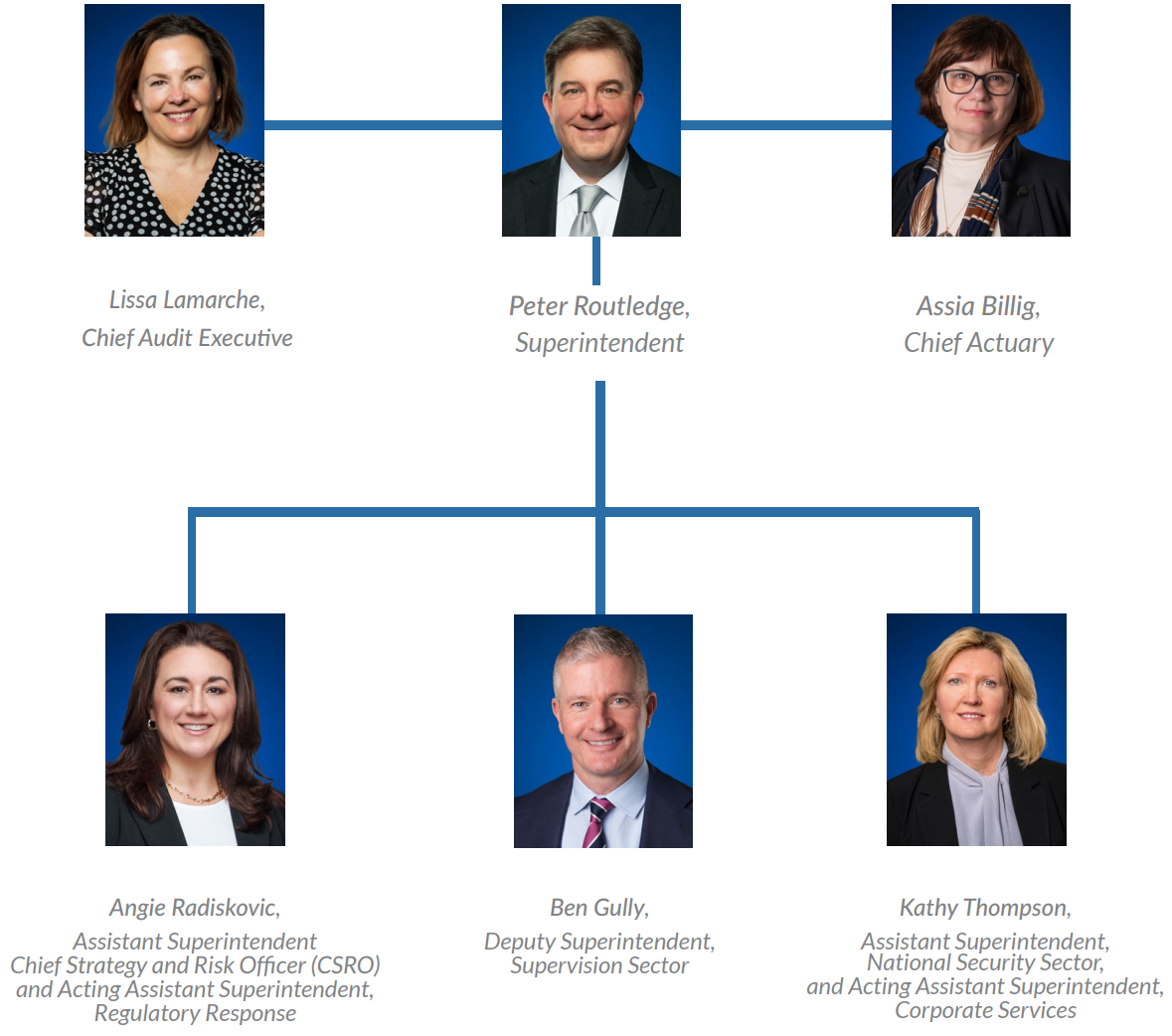Chapter 1: About us
Mandate
OSFI is an independent agency of the Government of Canada (GoC). We contribute to public confidence in the Canadian financial system by regulating and supervising approximately 400 federally regulated financial institutions (financial institutions)Footnote 1 and 1,200 federally regulated pension plans (pension plans).
In exercising our mandate, we protect the rights and interests of depositors, policyholders, and creditors of financial institutions while having due regard for the need to allow financial institutions to compete effectively and take reasonable risks. We also protect the rights and interests of pension plan members, former members, and entitled beneficiaries.
Our funding model
Our budget is prepared in accordance with the Basel Core Principles for Effective Banking Supervision. These core principles specifically enumerate the de facto minimum standards for the sound prudential supervision and regulation of banks and the banking system. We apply this vigorous, challenge-based process across all industries we supervise to ensure we identify key risks and allocate the resources required to discharge our mandate.
Per the OSFI Act, more than 99% of our expenses are cost-recovered, primarily through assessments on financial institutions and pension plans. As such, our expenses have minimal impact on the GoC’s fiscal position.
Our mandate is to:
-
ensure that financial institutions remain in sound financial condition and determine if pension plans are meeting minimum funding requirements and other requirements under the legislation
-
ensure that financial institutions protect themselves against threats to their integrity and security, including foreign interference
-
act early when issues arise and require financial institutions and pension plans to take necessary corrective measures without delay
-
monitor and evaluate risks and promote sound risk management by financial institutions and pension plans
Organizational context
Our organizational structure
Our organization is led by the Superintendent of Financial Institutions, who is also the deputy head of the Office. We have a diverse group of engaged and committed employees who work to enhance confidence in the Canadian financial sector. As of March 31, 2025, OSFI consists of five sectors, the Internal Audit team, and the OCA.
The OCA is an independent unit within OSFI, mandated to deliver a broad range of actuarial valuation and advisory services to the federal government. It prepares actuarial reports for programs such as the Canada Pension Plan (CPP), Old Age Security Program, and the Canada Student Financial Assistance Program. While the Chief Actuary reports to the Superintendent of Financial Institutions, the development of the reports’ content and actuarial opinions is conducted independently.
Internal governance
We have established a governance framework that is aligned with our risk management approach and three lines model. The internal governance committees serve to meet our strategic priorities within our risk appetite statement by enabling timely and risk-informed decision making, supporting agile risk response, and reinforcing governance discipline.
Our core governance committees
Executive Committee: Our senior level governing body that supports the Superintendent and is responsible for defining our overall strategic priorities and risks and providing effective oversight of our operations.
Supervision and Policy Oversight Committee: Our governance body that provides strategic oversight of supervision and policy issues, supporting the Superintendent with prudential oversight for financial institutions and pension plans.
Management Oversight Committee: Our central governance body on key operational, administrative, and corporate matters.
Enterprise Risk Management Committee: Our risk governance body that provides leadership and oversight for our risk appetite statement, enterprise risk management framework, and the assessment, monitoring, and reporting of key risks facing our organization.
Departmental Audit Committee (DAC): Our advisory body that provides the Superintendent with objective and independent advice in the areas of governance, risk management, and internal control. The committee membership includes external experts who are familiar with private and public sector financial reporting. The DAC also offers the Superintendent feedback and suggestions on specific emerging priorities, concerns, risks, opportunities, and accountability reporting.
Our executive leadership team

Our executive leadership team - text description
- Lissa Lamarche, Chief Audit Executive
- Peter Routledge, Superintendent
- Angie Radiskovic, Assistant Superintendent, Chief Strategy and Risk Officer (CSRO), and Acting Assistant Superintendent, Regulatory Response
- Ben Gully, Deputy Superintendent, Supervision Sector
- Kathy Thompson, Assistant Superintendent, National Security Sector, and Acting Assistant Superintendent, Corporate Services
- Assia Billig, Chief Actuary
Organization details
How we work
While OSFI is headed by the Minister of Finance and reports to Parliament through the Minister, our legislation distinguishes between the powers of the Minister of Finance and the Superintendent, which are exercised independently.
| Regulatory | Supervisory |
|---|---|
| We develop rules, interpret legislation and regulations, provide various regulatory approvals, and contribute to the development of new accounting, auditing, and actuarial standards. | We analyze financial and economic trends, assess financial conditions, non-financial, and material risks, and evaluate the quality of governance, risk management, and compliance. Additionally, we determine whether financial institutions have adequate policies and procedures in place to protect themselves against threats to their integrity or security, including foreign interference. |
Who we work with
The OSFI Act establishes the Financial Institutions Supervisory Committee (FISC) to coordinate on regulatory and supervisory matters. The FISC facilitates information sharing and discussion of issues related to financial institutions. Chaired by our Superintendent, FISC committee members include the Governor of the Bank of Canada (BoC), the Deputy Minister of Finance, the President and Chief Executive Officer of the Canada Deposit Insurance Corporation (CDIC), and the Commissioner of the Financial Consumer Agency of Canada (FCAC). The FISC meets on at least a quarterly basis.
While a close partner, as of March 31, 2025, the Financial Transactions and Reports Analysis Centre of Canada (FINTRAC) is not yet a member of the FISC. However, legislation introduced in June 2025 aims to include the Director of FINTRAC as a FISC member. FINTRAC and OSFI share strategic information regarding financial institutions’ compliance with anti-money laundering, terrorist financing, sanctions evasion, and national security obligations. Leveraging FINTRAC’s tactical financial intelligence and strategic information, OSFI undertakes supervisory examinations to verify that financial institutions maintain effective corporate governance, appropriate regulatory compliance management, and oversight of culture risks.
International organizations play a vital role in shaping regulatory frameworks. To support a resilient global financial system, we actively engage with key international organizations and participate in forums focused on developing international financial regulatory frameworks. These international organizations include: the Financial Stability Board, the Basel Committee on Banking Supervision, and the International Association of Insurance Supervisors.
Annual Risk Outlook
The risk environment we operate in
The risk environment for the financial system continues to evolve rapidly. Trade and economic uncertainties have increased, geopolitical tensions have heightened concerns around national security and foreign interference, and digital technologies have introduced both new threats and opportunities. Cyber warfare and digital attacks targeting critical infrastructure have become more frequent and severe.
Since 2022, we have published an Annual Risk Outlook (ARO) in the spring, followed by an update in the fall. The ARO identifies key risks facing financial institutions and outlines our supervisory and regulatory actions. Serving as a strategic risk oversight tool, it helps ensure alignment between key risks confronting the Canadian financial system and our regulatory response.
We released our 2024-25 Annual Risk Outlook in May 2024, highlighting four top risks and the actions taken to address them. These include risks related to real estate secured lending (RESL) and mortgages, wholesale credit risks, funding and liquidity challenges, and integrity and security concerns amid geopolitical uncertainty.
Our Semi-Annual Update released in October 2024 highlighted changes in the risk environment while reaffirming that the four top risks remain a consistent focus. In addition, the updated risk assessment found that integrity and security risks have continued to intensify and diversify. Notably, two key integrity and security risks were identified. The first risk concerns operational resilience, encompassing integrity and security risks stemming from governance gaps within financial institutions, third-party technology risks, and the threat of cyber incidents. The second risk relates to the impact and interconnected nature of artificial intelligence (AI) adoption.
In Canada, financial institutions and pension plans are interconnected through a complex web of relationships. Effectively managing and responding to risks in the financial sector during challenging times requires preparedness and agile, risk-based actions guided by early intervention.

Scarlett Li, Manager, Applied Research, Data and Analytics Risk

Suneil Dham, Senior Specialist IMIT, Data Collection Operations

Jo Kim, Specialist, Integrity and Security Risk Division

Bruno Levesque, Manager, Domestic Banking